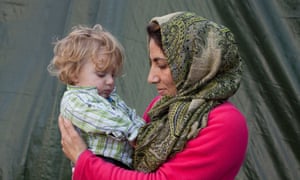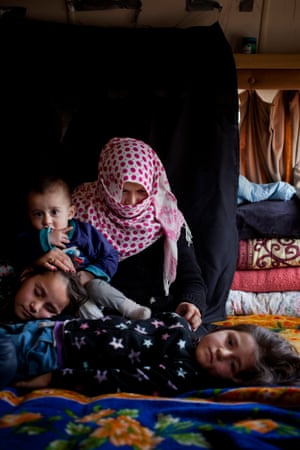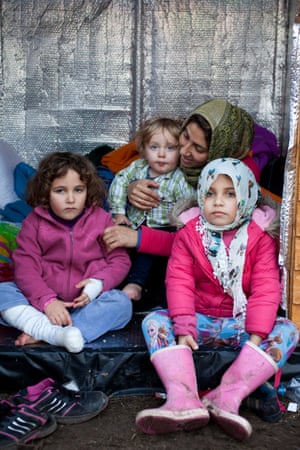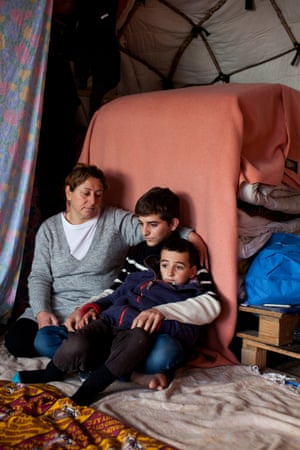hey have travelled for thousands of miles, carrying their babies in rucksacks and risking dangerous sea crossings. In Calais’s Jungle camp, we meet the women refugees forced to flee with their children
• Donate to our refugees appeal

In a caravan in Calais, two little girls are playing a game. While their mother’s attention is elsewhere, they hang out of the small gap of an open window, giggling as they see who can lean the farthest. They could be on a family holiday, if it wasn’t for the squalor surrounding them. Instead, the children are living on mud-covered scrubland, without electricity or heating – just two more inhabitants of the unofficial refugee camp on Britain’s doorstep.
A few minutes’ drive from the ferry port, the “new Jungle” is a symbol of the UK’s reluctance to deal with the refugee crises on our borders. Here, 200 women and children are said to be living among the 4,000 refugees, crammed into water-logged tents, caravans and even garden sheds. Thousands more live in similar conditions in nearby Dunkirk. While the young men who risk their lives jumping on to trains or lorries crossing the Channel have become the faces of this crisis, hidden in their midst are these families, trapped in an agonising limbo.
Rima, her shy son Adnan, five, and lively three-year-old daughter, Nour, are among them. The family fled Syria two months ago – just in time, Rima says, to avoid the fate of their nextdoor neighbours, who were killed in their homes the week before we speak.
The children’s father was imprisoned in 2012, when Nour was two months old. “There is no security in our city,” Rima tells me. “You don’t have to have done anything for them to put you in prison. Every day I begged the guards to release him. They asked me for money, so I sold everything, but it was never enough. Finally, after a year, they told me he was dead. They allowed me to come every day and plead for him when he was dead. They never gave me his body.”
Rima and her children joined the stream of refugees on what has become known as the “ant road”, from Turkey to western Europe. “Walking through the night was terrifying,” Rima says. “I had a bag on my back and I put my daughter in it. She was ill; she had a temperature of 41C. The most frightening point was when a man on a motorbike wanted to carry my little boy – he said he’d take only the boy, not the girl. I thought he might snatch him.”
Like many of the mothers here, Rima’s fear of imminent danger has been replaced with anxieties about the filthy, cold and sometimes violent conditions of the camp. As it becomes more permanent, little shops, cafes and even nightclubs have sprung up, giving a cruel imitation of a music festival – until the riot police come into view, standing guard near the motorway bridge.
Despite being just yards from pleasant French houses, and a short drive from Calais’s squares and restaurants, the Jungle residents rely on candles for light and open fires for warmth. Small fires that rip through caravans and tents are now a regular occurrence. In heavy rain, the area floods. At night, when the police clash with refugees, tear gas fills the air. The noise and insecurity are taking their toll on the already exhausted, traumatised children.
“Now, there are no bombs, but we are freezing and still afraid,” Rima says, adding that she developed a heart condition after her husband was imprisoned. “There is no heating and we are living in the mud. In the night, my daughter screams in her sleep and hits out, because she has bad dreams. Four days ago, my heart felt so bad that I thought I would die. If I am not here, who will look after my children?”
Around 400 luckier women and children have found a space in the state-run Jules Ferry Centre, which also provides a hot meal every day for up to 2,500 Jungle residents who live outside, and a hot shower for around 1,000. Dedicated British and French donors and charities have also stepped in, offering warm clothes and nappies, and opening a women and children’s centre with a playground. But their goodwill alone cannot provide lights, heating or somewhere private to wash.
For the mothers trapped here, all that is left is to put on a brave face and hope for a better life. Communities have sprung up; neighbours look after each other’s children and try to offer support. Despite their trying circumstances, people greet each other warmly.
As one woman tells me, with heart-breaking honesty, “If I cry in this Jungle, will anyone help me? No. I am in the Jungle, so I have to try and smile.”
Zari, 26, Aatiya, seven, Afshan, five, and Ismael, 13 months, from Afghanistan

Zari, Ismael, Aatiya and Afshan, from Afghanistan. Photograph: Abbie Trayler-Smith
“The Taliban do not like people to play music,” Zari tells me, explaining that her husband was a musician back home. “They came and beat him. I was very frightened.”
Her husband was hung up and hit with a plank of wood before being imprisoned. He managed to escape, and the family fled. “We faced so many dangers,” Zari says. “We had no clothes or bags. We sold our house and land to pay the smugglers. I carried the baby, and my husband carried the girls in turn. Our shoes broke, and for three nights we had nothing to walk in. The children were crying – they kept telling us they were tired and wanted to sleep. But still we had to walk. There were two nights when we had no food to eat.”
The crossing from Turkey to Greece, in a rubber dinghy overloaded with 45 other people, was the most terrifying part of the journey, Zari says. “I was very scared, I couldn’t stop shaking. We made the children sit in the middle of the boat and told them to sleep. The other 44 people were screaming – only my children were asleep.”
Despite the dangers, Zari insists the voyage was necessary. As we talk, her husband shows me a large scar on their older daughter’s leg, where she was hit by a bullet. “In Afghanistan, there is so much fighting and bombing,” Zari says. “We’ve seen people die in front of us. If we had died in Afghanistan, our children would have died, too, because who would look after them?”
Zari’s brother-in-law lives in the UK, and the family had hoped to join him, but they have no more money to pay smugglers. Their son has been ill with fever and diarrhoea since they arrived in Calais. “If we don’t go to the UK, we will die here,” Zari says. “I’m sad inside when I see my children living like this. My husband and I can’t read or write, and we want our children to go to school.”
Before we leave, her husband shows us what the Taliban objected to so violently: a long-necked lute, on which he plays a quavering tune. As melancholy music fills the room and he starts to sing, Zari leans back, her relaxed smile a small act of defiance.
Sara, 26, with Hana, seven, and Leyla, 16 months, from Iraq

Hana, Leyla and Sara, with their neighbour’s daughter. Photograph: Abbie Trayler-Smith
On the day we meet, Sara and her husband have had enough. The family of four are living in a garden shed, insulated with foil. They have been in the Jungle for 45 days, and say life has become intolerable. They had hoped to go to the UK, but have now decided to apply for asylum in France, in the hope they will leave the Jungle more swiftly.
Recently, there was a fire in one of the larger wooden sheds, and their older daughter Hana, seven, was burnt on the leg: the angry scar is still visible. “Now she is so scared, we cannot have even a candle in here,” Sara says. “She won’t go near a fire, even though it is so cold, and she won’t go near the place it happened. The children ask us to pray that it won’t rain or be cold. They are both ill.”
The family escaped the fighting in Iraq by fleeing to Turkey. “When Isis came, they took the area and everything was razed. Then American planes bombed and the Kurdish peshmerga moved in – there was a lot of fighting.”
A Kurdish friend, who is acting as a translator, chips in: “No one wants to go back,” he says. “We would rather die here. We have family and lives there, but we need to be safe.”
Staying in Turkey, or other countries closer to Iraq, is not an option, they say, because of the way Kurds are treated there. Instead, they took a terrifying boat journey to Greece, and barely escaped with their lives.
Azada, 39, Firaz, 15, and Lawo, five, from Iraq

Azada, Firaz and Lawo, from Iraq. Photograph: Abbie Trayler-Smith
Azada is unceremoniously pulling the blankets off her teenage son to wake him up: she wants to tell her story, and needs the sleeping 15-year-old to translate for her. After a brief tug of war, Firaz emerges and, despite the rude awakening, sweetly agrees.
The family lived in Kurdistan, before the war. “I liked my home, and my life,” Azada tells me quietly, “but then Daesh came and started killing everyone.
“My husband was with the peshmerga – he was a soldier – and when Daesh took Kirkuk, he told us to leave and go to the UK; he would stay and fight,” Azada says. “There was no life there any more. I loved Kirkuk, but they destroyed everything.
“They wanted the younger boys to come and fight for Daesh – 16-year-olds – to go and kill for them, so we had to leave. I was scared they would take my sons.”
While the family was trying to cross the sea from Turkey to Greece, Azada’s 17-year-old son was separated from his mother and siblings. They have not seen him since. “My mother is so worried,” Firaz says sadly. “We searched for a long time, but we couldn’t find him. Then someone told us he is in the UK, so now we are trying to join him there.”
Her eyes filling with tears, Azada says there has been another price to pay for the family’s escape: she was three months pregnant when she left Iraq, but while they were in Greece she miscarried.
She worries, too, about her five-year-old son, who is desperately missing his father. “He won’t listen to anyone now, because his father always looked after him.”
They live among other Kurdish families in a wooden room, where the roof leaks, and they don’t feel safe. “There was a fight with the police,” she tells me, “and there was tear gas. We don’t want to stay here. “This is no life. There is no food, no showers, no way to keep anything clean. In the night, there are so many noises, we can only sleep from 7pm to 8pm.”
Like many other refugees in the Jungle, she points to British donations as a sign that the UK is a kind country. And with the hope that her older son may be waiting for them, the family are even more determined to make it there.
“I want a home to rest in, and my children to be able to go to school again,” Azada says. “I am so worried for them. Before Daesh, our life was good. But they have destroyed everything.”
[Source:- The Gurdian]
